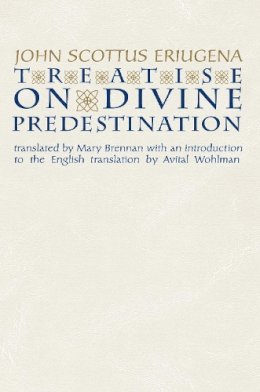11%OFF

Stock image for illustration purposes only - book cover, edition or condition may vary.
Treatise on Divine Predestination (Notre Dame Texts in Medieval Culture)
John Scottus Eriugena
€ 36.99
€ 33.00
FREE Delivery in Ireland
Description for Treatise on Divine Predestination (Notre Dame Texts in Medieval Culture)
Paperback. One of the earliest writings of the author of the great philosophical work, "Periphyseon" (On the Division of Nature), Johannes Scottus, known as Eruigena. It contributes to the age-old debate on the question of human destiny in the present world and in the afterlife. Translator(s): Brennan, Mary. Series: Notre Dame Texts in Medieval Culture. Num Pages: 168 pages. BIC Classification: HPCB. Category: (P) Professional & Vocational; (UP) Postgraduate, Research & Scholarly; (UU) Undergraduate. Dimension: 200 x 157 x 12. Weight in Grams: 245.
Treatise on Divine Predestination is one of the early writings of the author of the great philosophical work Periphyseon (On the Division of Nature), Johannes Scottus (the Irishman), known as Eriugena (died c. 877 A.D.). It contributes to the age-old debate on the question of human destiny in the present world and in the afterlife.
The work survives in a single manuscript of which editions were published in 1650 and 1853. It has been most recently edited in 1978. The present translation was made from that edition. Modern scholars are able to discern in this early work strong intimations of Eriugena's later major writings.
Product Details
Format
Paperback
Publication date
2003
Publisher
University of Notre Dame Press
Condition
New
Series
Notre Dame Texts in Medieval Culture
Number of Pages
277
Place of Publication
Notre Dame IN, United States
ISBN
9780268042219
SKU
V9780268042219
Shipping Time
Usually ships in 4 to 8 working days
Ref
99-2
About John Scottus Eriugena
Mary Brennan was for eighteen years researcher and archivist at the Society for the Promotion of Eriugenian Studies, located at that time at University College Dublin. Her publications in this field since 1977 include Guide des Etudes Erigéniennes, A Bibliography of Publications in the Field of Eriugenian Studies, 1800–1975, and Materials for the Biography of Johannes Scottus Eriugena. Avital Wohlman is part of the department of Philosophy, Faculty of the Humanities at the Hebew University of Jerusalem. Her research interests are ancient philosophy, medieval philosophy, and philosophy of biology.
Reviews for Treatise on Divine Predestination (Notre Dame Texts in Medieval Culture)
"The De divina praedestinatione liber was written in 850-51 at the request of two prelates while John the Scot resided at the court of Charles II, grandson of Charlemagne. It is his earliest attested work, a refutation of the heretical teaching of Gottschalk on double predestination. Both John and Gottschalk claimed to base their interpretation on St. Augustine, and both continued to be subjects of controversy during the decade between 850 and 860." —Theology Digest "Mary Brennan's translation is as helpful as her foreword. The rendition into English of Madec's text from the Corpus Christianorum is careful. The book is elegantly produced and a delight to read." —The Medieval Review
